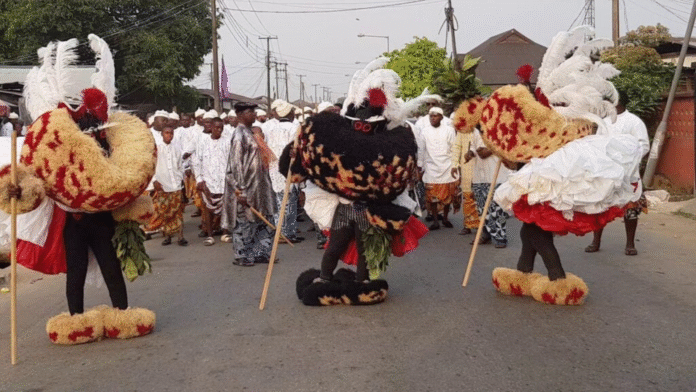Among the Efik people of southern Nigeria, society is not just structured, it is harmonized. The Efik have one of the most admired fraternal systems in West Africa, particularly through the Ekpe society, a sacred and powerful brotherhood that functions as a traditional government, cultural guardian, and spiritual authority. Within this society, leadership is not about domination but about duty, fairness, and accountability.
The Ekpe fraternity promotes justice, unity, and social order, maintaining a strong code of conduct and ritual discipline. What’s most remarkable is the Efik concept of social balance, every class and age group has defined responsibilities, yet no one is considered too high to be questioned or too low to be protected. It’s a cultural system where equality isn’t just spoken, it’s practiced.
Spiritual Life and Beliefs
Efik spirituality is deeply rooted in ancestral reverence, ritual purity, and cosmic balance. Traditional beliefs include the existence of Abasi Ibom (Supreme God), various nature spirits, and the reverence of ancestors through festivals, libations, and masquerades. Spiritual leaders, including chief priests and Ekpe elders are not just religious guides, but social symbols of wisdom and balance.
The Efik people also blend Christianity with traditional beliefs. Many maintain dual religious identities, upholding family shrines while attending Sunday church services. This duality reveals a spiritual maturity, a community that honors its roots while embracing modernity.
Love, Marriage, and Gender Roles
The Efik approach to love and marriage is deeply ceremonial and symbolic. Courtship traditionally involves gift presentations, family negotiations, and elaborate marriage rites, with a strong emphasis on female honor and male responsibility.
What sets the Efik apart is the respect given to women. Efik women are historically known for their grace, intelligence, and power. Through associations like the Nka Ikwo (women’s group), women maintain societal order, settle disputes, and hold leadership roles in family decisions.
Growth and Rites of Passage
The Efik mark life’s major phases with rites of passage that shape identity and community connection. Boys are trained early through age-grade groups and cultural education, while girls undergo rituals like the Fattening Room, a traditional retreat that teaches womanhood, homekeeping, and cultural pride.
The Fattening Room, contrary to modern misunderstanding, is not merely about beauty; it is about transformation, knowledge, and preparing a woman to be strong, graceful, and wise in marriage and society.
Cultural Symbols and Dress
Efik people are visually recognized by their elegant attire, especially during ceremonies. Men often wear white lace with red caps, while women are adorned in George wrappers, head ties, and coral beads. all of which symbolize dignity and royalty
Cultural music, dances like the Ekombi, and storytelling are central to their identity, often used to teach morals, history, and joy across generations.
Food and Communal Life
Efik cuisine is world-renowned dishes like Afang soup, Edikang Ikong, and Ekpang Nkukwo are not just meals; they are cultural treasures. Cooking is a communal experience, and food is always at the center of gatherings, ceremonies, and even spiritual offerings. Sharing food is seen as a way of strengthening communal bonds and expressing love.
Modern Influence and Diaspora
Today, the Efik people continue to thrive, both in Nigeria and in diaspora communities around the world. Many Efik descendants are making waves in education, politics, media, and entrepreneurship. Yet, despite modernity, they still carry their identity with pride. Cultural festivals like “Ndok” and “Usoro Ekpe” are still celebrated to preserve their ancient traditions while evolving with the times.
Conclusion
The Efik people represent a beautiful paradox, a community built on ritual discipline and joyful expression, equality and hierarchy, tradition and modernity. From their powerful fraternal systems to their rich food, sacred rites, and enduring values, the Efik are more than just a tribe, they are a cultural blueprint of balance, brilliance, and belonging





